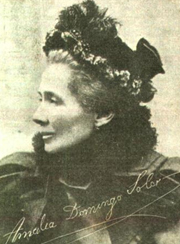Amalia Domingo Soler
 Spiritist Group of New York
Spiritist Group of New York
November 2003
Great Exponents of Spiritism
During the time in which the sun had not as yet set on the vast Spanish empire – that covered the Americas and extended throughout the Pacific – the city where Amalia was born, Seville, was the seaport accessible to all the territories beyond the seas. Wealth from every corner of the planet flowed into its warehouses, and from there was
distributed to finance the countless wars that were schemed
up by the kings.
It was precisely after the crumbling of that empire, mortally wounded by the Napoleonic wars and by the loss of most of its American colonies, that Amalia was born. The day was November 10, 1835. On the throne of Spain sat a young girl, Isabel II, with her mother Maria Cristina, as the regent. This reign was becoming an extremely perturbing period, noticeable by ministries of short duration, the religious crisis, epidemics and civil war – the Carlist wars – whose side effects were still to be felt in the following century.
The direct results of so many difficulties affected the economy. Poverty characterized the life of the majority of the population.
It was in such a problematic environment that Amalia Doming Soler spent her childhood; a childhood that could not be considered a happy one. Even before she was born, she would be facing a great loss. Her father departed on a great trip and was never to return. At the age of eight she became blind, but three months later her sight improved because of the treatment she received from a pharmacist.
Notwithstanding, she never fully recovered and continued encountering problems with her sight throughout her entire
life, with the constant threat of complete blindness. The following years of her life were spent relatively peaceful in the company of
her mother. “In my eyes, which had become very imperfect, I do not understand what my mother saw, as she consecrated herself entirely to me, and had no other desire, except that of seeking to make me happy and to procure my education. When I became two years of
age, she commenced the difficult task of teaching me to read. As a reward for her dedication, at the age of five I could already read perfectly well, and everyday, for two hours, I was required to read out loud. Our spirits were in such incredible unison, that through a simple glance at one another we could guess the other’s thoughts.” (Amalia
Domingo Soler – “My Life”) Amalia wrote her first poems at the age of ten, and at eighteen she published her first verses.
Amalia never married, and at 25 tears of age, upon her mother’s death, the most difficult phase of her life commenced. The sparse resources that her mother possessed had been fully spent on Amalia’s medical treatment and with the assistance to her relatives. In this manner, in addition to the solitude, days of severe poverty commenced
for Amalia. The alternatives proposed by some of her relatives were impossible for her to accept: either to go to live in a convent, or to accept an arranged marriage to a much older gentleman, in a good financial situation.
She then decided to go to Madrid in the hopes that she would find more opportunities there to guarantee her survival with her poems and with a modest job. Nonetheless, her struggles were tremendous. She starved and had to beg for assistance at houses of charity. It was very difficult to find an honorable form of work for a poor, abandoned woman. During this time, because of the loneliness and hunger, she even considered the possibility of ending her life. On one night, in which she had become overwhelmed with bitterness, including thoughts of doubting the existence of God, she was wondering about her mother’s destiny, and the latter, appeared to her in spirit,
causing a tremendous impression upon her.
Quite shaken with the amazing vision of her mother, she remembered religion and sought comfort in the temples of faith. It was in the bosom of a Lutheran church that she found the necessary support. The words of the shepherds and the conviction displayed by
the followers renewed her inner disposition, filling her heart with renewed faith and comfort in her trust in Jesus.
Her continuous efforts to write poetry, in addition to some work at sewing that she did, along with her life’s difficult struggles, significantly worsened and impaired her eyesight. It was only thanks to a homeopathic treatment she received from a doctor that
she was able to escape complete blindness. It was also this same doctor, who informs her about the so-called “crazy”, followers of a new doctrine, called Spiritism. He loaned her a copy of a Spiritist Periodical “The Criteria.” The most curious aspect about this fact is
that the doctor was a materialist, but he mentioned Spiritism to her in order to offer her some comfort for her afflictions.
It is through reading an article of this periodical that she becomes convinced of the truths presented by Spiritism, thereby seeking out additional information. She commenced the study of Spiritism through whatever channel that reached her hands, and
she commenced to write some articles for the Spiritist Reviews, so that she could have access to them. Her first spiritist work, a poem that she had sent to “The Criteria,” was not published; but the editor, Visconde de Torres Solanot, wrote her a letter and sent it
along with a book that he had written (“Preliminary of Spiritism”).
It is in the periodical “The Revelation” at the city of Alicante that for the first time a poem written by Amalia Domingo Soler was published. Her first doctrinaire article, “The Spiritist Faith” is published by “The Criteria,” number 9, of 1872. Her articles began to arouse the attention of the readers and shortly thereafter she joined the Spanish
Spiritist Movement, participating in their meetings.
It was in March, of 1875 – the celebration of Kardec’s discarnation – that in the room of the Spanish Spiritist Society, in the presence of its members, Amalia reads her poem, “To the memory of Allan Kardec.” From that moment on, she joins the lines of the disseminators of the Spiritist Doctrine. She was a great writer; her work touched both heart and reason, and her extraordinary spirit conquered once and for all the sympathies of the Spanish spiritists.
Fernandez Colavida, sent her, as a present, the collection of books of Allan Kardec. The spiritists of Alicante invited her to remain with them, under their protection so that she could dedicate herself entirely to the dissemination of Spiritism.
